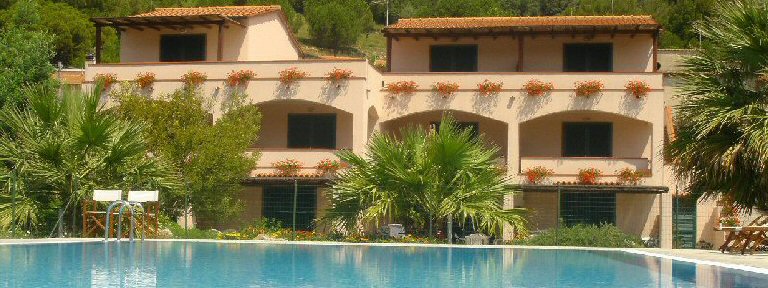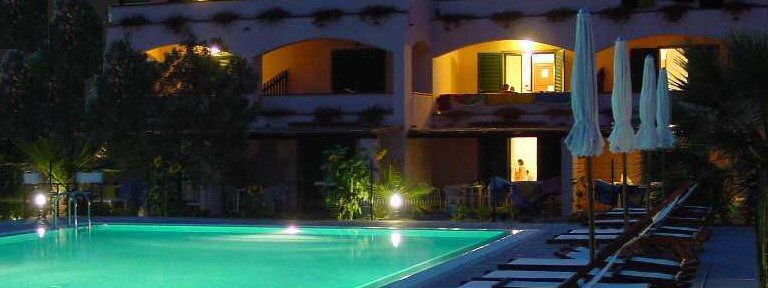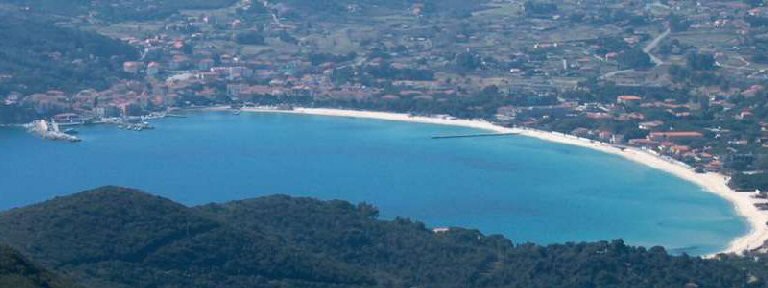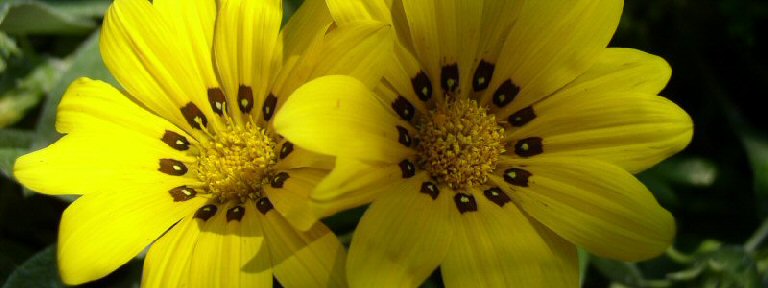You choose Elba
Island of Elba, the pearl of the Tuscan Archipelago, lying only 10 km. from the mainland (1 hour by ferry), Elba is the largest island in the Tuscan Archipelago and having a surface area of 224 sq. km., it is the third Italian island in size. Her coastline winds for 147 km.The uncontaminated coasts, the crystalline sea, the luxuriant nature and a mild climate also in the winters months, recall guests from each part of the world.
Fifty beaches and plenty of golden sanded or white pebbled creecks, bluffs to peak on the sea are always ready to offer you a peaceful hideout in every season.
Casket of precious minerals, of an uncontaminated nature, that is revealed through a typical mediterranean bush, of jagged rocky crests, silent villages lying over the sea or scrambled on the ridges.
This is the island of Elba: with its emerald sea, sweet and caressing winds, green and colourful woods and its warm and hospitable people.
Island that discloses its secrets to people who like discovering them.
Λ up
You choose Marina di Campo
Choose Marina di Campo because there is nothing better for a family with children.White sandy beach, private and public beach, with a small port and all facilities, supermarkets, pharmacy, bars, restaurants, lots of shops, a beautiful promenade.
Ideal for young people, the nightlife is guaranteed and for sportsmen numerous sporting events of all kinds, Marina di Campo is located to the south and center of the island, so ideal for those who want to move to visit the other beaches.
Surely the most beautiful beaches are located in the south, to name some of the most famous, always located in the municipality of Campo in Elba, Cavoli and Fetovaia, get there by car in minutes.
Also in a few minutes you can reach typical villages of San Piero and Sant'Ilario and Monte Perone.
Λ up
History
The island of Elba offers memory of times gone-by during which this little island was fought over, for two main factors: its strategic geographical position and the wealth of minerals which lie in her earth, by all the big powers. Many civilizations and dominations have left their traces on this island. According to mythological narration it was at Porto Argoo, the actual Capo Bianco that Jason stopped over at during his adventurous research for the golden fleece. As related by Virgil in Aeneid, 300 Elban youths sailed from this same bay taking aid to Pio Enea in his fight against the Rutuli. For the Etruscans Elba was an inexhaustible source of wealth, as early as the eighth century B.C. they exploited the mines and exported the ore mainly to the southern Mediterranean area making enormous profits.
Their ovens, for working iron, became numerous. After five centuries of Etruscan domination all that remains are several necropolis, a few remains of Etruscan furnaces, numerous "hill villages" integrated into incomparable surroundings.
With the decline of the Etruscans, the Romans inherited the steel and iron industry but also exploited the granite quarries and discovered the curative mud baths of San Giovanni, the beauty of the landscape and the excellent wines. On the attractive bays of the Linguella, Roman Villa Le Grotte and Capo Castello sumptuous patrician villas were built, today still as delightful as ever.
During the Middle Ages it was the turn of the Maritime Republic of Pisa to exploit the iron ore mines and granite quarries. Of the Pisan domination much evidence remains, the refined romanesque churches and the Torre of San Giovanni in Campo, built on an enormous granite block, the imposing Fortezza of Marciana and the Volterraio castle, sentinels of both land and sea.
In 1548 the feudal state of the Appiani family was then followed by the control of Cosimo de'Medici who created his "Cosmopoli" (today Portoferraio) on the remains of the Roman "Fabricia". Enclosing the town with powerful walls, the inhabitants were then safe from pirate attacks.
The Spanish established themselves in Porto Azzurro and also set out to defend the territory by constructing the solemn Fort St. Giacomo which even today, as a penitentiary, towers over the lively town. Even the English, the Germans, and the French were interested in Elba and challenged each other through diplomacy and arms to gain control of the island The historical period which made Elba famous was the brief exile of Napoleon, he remained nine months, from 4 may 1814 to 26 february 1815.
Bonaparte left a significant mark on this minute kingdom. He built roads, riorganized the mining economy, increased the production and exportation of the local wines.
From an ancient deconsecrated church he made a charming theatre, which, thanks to a clever restoration is today home to important international cultural events.
On his return to France for his last fateful hundred days, Napoleon left two Elban residences (Villa di San Martino, Villa dei Mulini), both of which are now national museums frequented by thousands of visitors each year.
Elba not only offers interesting finds for historians and archaeologists therefore, but also for those who simply like to browse among treasures, testimony of the past.
Λ up
Climate
The most prevailing wind on the island is known as lo scirocco (south easterly gale), which is not a particularly strong wind, known to alternate regularly with the fresher north westerly maestrale (mistral), making afternoons at the sea's side more comfortable. The winds known as "libeccio" and "ponente" (respectively south westerly and westerly gales), although less frequent, are capable of agitating the seas to a point that navigation to the mainland becomes impossible. Fortunately, this is a rare occurance, taking place only once or twice a year. The icey cold winds known as the "tramontana" and "grecale" are winds that prevail from the north and north-east respectively. Fortunately, both of these winds are quite rare but none the less, the island's formation is such that a shelter from these more tedious winds, can always be found.Snows are rare even if the peak of Mt. Capanne is blanketed each year by light snowfall. The average temperature in the Summer is 22.7° C, while the annual average is 15.7° C. In the course of the year there are approximately 168 fine days, 88 variable and 109 cloudy; rain is concentrated mainly in the Winter months.
Any season is good to come in Elba it just depends on what you enjoy best.
Spring is special for Elba's wildflowers and the nesting season.
Summer is obviously a favourite for the warm temperatures of both sun and sea.
Autumn is ideal for gathering chestnuts, Porcini mushrooms, and enjoying the grape harvest.
The mild water temperature allows pleasant swimming well into October. In fact, any time from Easter to the end of October makes for a perfect holiday stay.
Weather Campo nell´Elba
Λ up
Nature
In Elba, nature is the absolute ruler, the absolute dominetor of the landescape.The island is a continous discovery: the sea changes colour in every creek.
On the south shore it clashes over white cliffs or rails at vast beaches, while on the north shore it seeps in the creeks among the very high cliffs or it caresses some quiet pebbled beaches.
In a few minutes you can go from the granitic massif of Monte Capanne, the realm of moufflons and wild goats, areas of the east side, a real "Eldorado" for scientists and geology lovers.
Elba does not only mean seaside, it also endless surprises to its hosts, and these can be best enjoyed during spring and autumn, when the island reveals its deepest essence.
Luxorius bushes made of colours and perfumes, the pine woods, the chestnut woods, the ilex woods, the agaves and the Indian figs of the sunny south coasts: this is a corner of the world that has been able to preserve, next to the modern ag, the old age and evoking uncontaminated widerness. Nature has been particularly generous with this island and has granted a wide variety of aromatic and therapeutic plants that flourish spontaneously, thanks to the mild climate and to the fertile soil.
We find typical Tuscan vineyards (wine being Elba's traditional product, not to mention the fish!).
And then you have Elba's towns: those on the sea, which often maintain the ancient flavour of a fishermen's shelter, and those chiselled out of the rock up high, which still tell us about pirate raids of long ago.
Λ up
Sports
It's the reign of cyclists, divers paradise and a "never- ending trail" for trekking fans. The Island of Elba is the ideal location for sports enthusiasts and those seeking an active holiday. It offers the perfect combination: nature, sea and sport. Thanks to its mild climate in spring and autumn and its uncontaminated natural beauty, the island satisfies both fans of extreme sports and more laid back guests.Everybody can partecipate in the many outdoor activities, surrounded by crystal seas or in the shadow of imposing cliffs Numerous species of fish inhabit the fascinating seabed and natural grottes, all that the most demanding scuba driver could ask for. Fat bellied sails and silent canoes criss-cross the sea caressing the most well known beaches.
The best way to venture along pathways and wooded trails is on foot, horseback or mountain bike. From these vantage points you will be able to discover small villages hidden in the maquis and fully appreciate the fragrant vegetation surrounding you.
Whether you want to test your limits launching yourself off a cliff with a glider or rock climbing the island's many peaks or if you want to spend a relaxing day on the golf course, you will find all you need in the well equipped centres. Even those of you who are beginners or out of practice can try out some type of activity under the guidance of able and professional instructors.
Tennis, horse riding, canoeing, diving, cycling, golf, rock climbing, whether you want to relax, improve your skills or simply just have fun: Elba awaits you!
On a mountain bike you can go round all the island and discover the landscapes always different, day after day. Penetrate the naturalistic zones, minings or go direct to the sea.
Λ up






